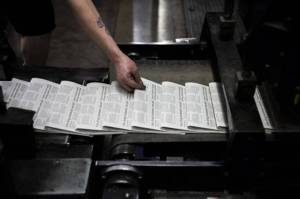Comment: Democrats’ shuffle of state primaries could hurt Biden
Published 1:30 am Monday, July 10, 2023
By Jonathan Bernstein / Bloomberg Opinion
Democrats are struggling with the consequences of their decision to reorder the party’s presidential nomination calendar next year. The truth is, their worries are mainly symptoms of the fact that the party is on its way to renominating a president who hasn’t been popular for the last two years.
But the controversy over the schedule is also an example of a misstep by President Biden and the White House. As with most presidential mistakes, the direct impact is small, but small hits to the president’s reputation can add up over time.
The drama is over a decision by Biden and the Democratic National Committee to change the calendar of presidential primaries. Instead of beginning with the Iowa caucuses, followed by the New Hampshire primary, as has been the case for decades, Biden — and therefore the DNC — want South Carolina to kick off primary season. The problem is New Hampshire state Democrats are refusing to give up their first-in-the-nation slot and are threatening to defy the DNC, scheduling their primary for January to stay in front of South Carolina’s early February date. If the DNC and New Hampshire can’t strike a deal, Democrats will officially boycott New Hampshire and Biden won’t appear on the ballot there. That means Robert F. Kennedy Jr. or Marianne Williamson, the two fringe candidates who are running against Biden for the nomination could end up winning.
A loss in the state — even if he isn’t on the ballot — would be embarrassing for Biden and no doubt generate a few days of negative publicity. Nor is anyone in the national Democratic Party excited about feuding with either New Hampshire state officials, its Democratic politicians or state party leaders.
Realistically, however, neither Kennedy nor Williamson has any chance of winning the nomination. A New Hampshire hiccup isn’t going to change that and will be long forgotten by the time the fall 2024 campaign gets underway.
And yet it’s still not clear what Biden and the White House were thinking when they pushed the DNC to re-order the early primaries, especially in taking on New Hampshire, without a plan for implementation.
It’s not surprising that Biden wanted a new calendar. Democrats have long believed that Iowa and New Hampshire are problems because both states are predominately white, while the party has become increasingly diverse. Biden and the DNC wanted to elevate states that are more reflective of the party and nation’s diversity and show Americans of color that their votes matter.
But it’s one thing to want a different calendar. Achieving it is more difficult. The national formal party structures — the Democratic National Committee and the Republican National Committee — can set any rules they want about the calendar, but they don’t have the authority to implement them. In most states, presidential primaries are set by state law. Even in states with a Democratic governor and Democratic majorities in the legislature, the influence of the national party is limited at best. In states where Republicans hold control, it’s likely non-existent.
State parties are generally free to run their own delegate-selection procedures regardless of what the state government does, but doing so is expensive; and more so given that the DNC also wants (more expensive) primaries, not caucuses.
So when Biden pushed for a new calendar, he was actually taking on several state governments without any way of getting them to do what he wants. New Hampshire, in particular, has always been well-equipped to fight back against any national party attempts to dislodge it from its cherished first-in-the-nation status.
And while the symbolic value involved may matter, beyond that it’s a misreading of the process. Presidential nominations are increasingly national processes, which has meant that winning and losing in the early states just doesn’t have the independent importance that it had in the 1970s and 1980s.
That should certainly be obvious after 2020, when Biden was crushed in the first two state primaries, but was easily nominated anyway after his crucial second-place finish in Nevada (with a growing Latino population) and then a win in South Carolina, with its Black-majority Democratic primary electorate. The point is that a strong national campaign can withstand early losses, while early wins by a candidate who is weak nationally (such as Pete Buttigieg, who won in Iowa in 2020) don’t mean much. Indeed, party actors and the media interpret those very white early states in the context of their demographics, which limits the damage they can do to a candidate who has strengths with Black voters.
The bottom line: Biden’s effort to downgrade New Hampshire created headaches for the party and a likely loss for him without having much of an upside.
If presidential power depends in large part on a president’s reputation, then mistakes such as this one can matter going forward in all sorts of ways. Presidents want it to seem as inevitable as possible that they’ll get what they ask for. Presidents want everyone they deal with to assume competence, and even mastery, at negotiations. And presidents want to give their allies — such as Democratic politicians in New Hampshire — an expectation of respect and support. To be fair, Biden has mostly done a good job of protecting his reputation. But on this one, it’s hard to see how he’s helped himself at all.
Jonathan Bernstein is a Bloomberg Opinion columnist covering politics and policy. A former professor of political science at the University of Texas at San Antonio and DePauw University, he wrote A Plain Blog About Politics.


